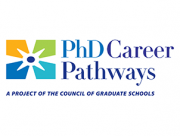You are on CGS' Legacy Site.
Thank you for visiting CGS! You are currently using CGS' legacy site, which is no longer supported. For up-to-date information, including publications purchasing and meeting information, please visit cgsnet.org.

FOR IMMEDIATE RELEASE: Contact: Katherine Hazelrigg
August 12, 2021 (202) 461-3888 / khazelrigg@cgs.nche.edu
Washington, DC — Today the Council of Graduate Schools (CGS) announced awards designed to catalyze innovation in the preparation of humanities PhDs for diverse careers. Through a competitive sub-award process, a committee selected ten U.S. doctoral-granting institutions to join The Humanities Coalition, which will develop and assess initiatives for better supporting humanities PhD students transitioning from graduate programs into the workforce.
Universities will be working in one of two areas: grant-writing and resource development, and building professional networks. One set of universities will prepare current humanities doctoral students to identify and cultivate funders of research, scholarship, and programs and to develop successful proposals for financial support. This area of focus, which will support Howard University; Loyola University; Purdue University; Southern Mississippi University; University of California, Irvine; and University of Texas at El Paso, is designed to prepare doctoral students for careers in areas such as university sponsored programming, non-profit leadership, and corporate relations.
A parallel group of awardees—City University of New York, University of Arizona, Wayne State University, and Michigan State University— will develop programs to help current humanities doctoral students build professional networks and relationships. Activities will include building programs that connect current doctoral students with PhD alumni in a broad range of careers, developing opportunities for doctoral students to build networks that inform and advance their career goals, and piloting modules that help humanities PhD students develop their professional networks.
This latest project is an expansion of prior work that included developing and supporting a network of 75 U.S. doctoral institutions as they collect data from STEM and Humanities PhD students and alumni about their professional aspirations, career pathways, and career preparation. In general, data from the project yield a positive picture of humanities doctoral education. Most alumni reported that they are engaged in meaningful work and believe their doctoral work prepared them for their current job responsibilities. However, data also indicate that humanities PhDs who were employed in business, non-profit, or government, particularly those in the early stages of their careers, feel less prepared than their peers working at universities.
“Building on the extraordinary work of the PhD Career Pathways project, The Humanities Coalition will develop, expand, and scale up a suite of programs and practices in key areas of need. We’ve been conducting research in career diversity for nearly a decade, and this work will take the next logical step from better understanding aspirations to preparing for successful careers,” said Suzanne Ortega, president of the Council of Graduate Schools. “We know that humanities PhDs have many possible career paths in front of them. We need to make sure they know their options, how to access them, and that they’ve developed the skillsets necessary for success.”
The Humanities Coalition includes grantees as well as universities that submitted competitive proposals to participate. The full list of participating organizations, includes: Arizona State University; CUNY Graduate Center; Howard University; Indiana University Bloomington; Loyola University Chicago; Michigan State University; Purdue University; Texas A&M University; The University of Southern Mississippi; The University of Texas at El Paso; University of Arizona; University of Arkansas; University of California, Irvine; University of Missouri; University of Rochester; University of Wisconsin-Madison; and Wayne State University.
The current project builds upon three earlier phases of CGS research: a feasibility study supported by the Alfred P. Sloan Foundation and The Andrew W. Mellon Foundation; a survey development phase supported by the Mellon, Sloan, and National Science Foundations (NSF #1534620); a survey implementation phase supported by the Mellon Foundation and NSF (#1661272); and an examination of factors likely to impact retention and persistence in STEM careers, particularly for underrepresented students, supported by NSF (#2000750).
###
About CGS
The Council of Graduate Schools (CGS) is an organization of approximately 500 institutions of higher education in the United States and Canada engaged in graduate education, research, and the preparation of candidates for advanced degrees. The organization’s mission is to improve and advance graduate education, which it accomplishes through advocacy in the federal policy arena, research, and the development and dissemination of best practices.




